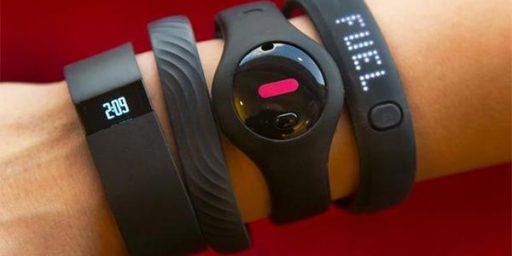Soldiers Revealing Secret Locations With Fitness Wearables
A quarter century ago, soldiers were first using GPS to help them navigate the battlefield. Now, GPS is giving away their location.
A quarter century ago, soldiers were first using GPS to help them navigate the battlefield. Now, GPS is giving away their location.
WaPo (“U.S. soldiers are revealing sensitive and dangerous information by jogging“):
An interactive map posted on the Internet that shows the whereabouts of people who use fitness devices such as Fitbit also reveals highly sensitive information about the locations and activities of soldiers at U.S. military bases, in what appears to be a major security oversight.
The Global Heat Map, published by the GPS tracking company Strava, uses satellite information to map the locations and movements of subscribers to the company’s fitness service over a two-year period, by illuminating areas of activity.
Strava says it has 27 million users around the world, including people who own widely available fitness devices such as Fitbit and Jawbone, as well as people who directly subscribe to its mobile app. The map is not live — rather, it shows a pattern of accumulated activity between 2015 and September 2017.
Most parts of the United States and Europe, where millions of people use some type of fitness tracker, show up on the map as blazes of light because there is so much activity.
In war zones and deserts in countries such as Iraq and Syria, the heat map becomes almost entirely dark — except for scattered pinpricks of activity. Zooming in on those areas brings into focus the locations and outlines of known U.S. military bases, as well as of other unknown and potentially sensitive sites — presumably because American soldiers and other personnel are using fitness trackers as they move around.
While DoD is putting out new guidelines to deal with this issue—and will almost surely wildly overreact—one wonders what possible value the Global Heat Map adds? Why is it that we need to publicly track the whereabouts of those wearing fitness trackers?






Lotta GIs are gonna be in OPSEC lectures this week…
One possible reason is personal safety as odd as it sounds. Joggers, especially females, are at risk of physical violence due to the nature of the habit: out running at odd times, alone in underpopulated or poor lit areas, etc. I know many female joggers who carry a panic button and would gladly sacrifice privacy so somebody knows where they are in case of emergency.
That being said, why is this only an issue now? Smartphones have GPS and I promise you, not everyone turns theirs off. Nobody’s noticed sudden hotspots due to mobile devices or tablets before? I think that’s the more likely culprit then a bunch of soldiers running around with Fitbits in the desert sands.
@KM: Fair point on smart phones, which create all manner of command headaches. And, yes, I get why it might be useful for it to be possible to track the locations of Fitbit wearers in emergencies. I can’t come up with a good reason to publish a heat map, though.
@James Joyner:
> I can’t come up with a good reason to publish a heat map, though.
As someone who works within the Tech sector, it’s a three part answer:
1. Because companies want to demonstrate that they have the data and can do things with it.
2. Because it’s easy to do and engineers tend to think it looks “cool.”
3. To demonstrate how they have a worldwide product.
@Matt Bernius: As someone who doesn’t work in the Tech sector, none of those strike me as very good reasons 😉 But, yes, it makes sense that they’d want to show that they can.
@James Joyner: The NPR report on this this morning suggested that cities are other entities who wanted to determine use of facilities (e.g., running trails) would find this sort of data useful.
Looking at the map (which is pretty cool), it could also give runners or bikers new ideas of places to go (or to avoid, as the case might be).
@Steven L. Taylor:
Both are definitely potential uses. My guess however is that Strava had neither in mind when they initially released the heat map. Which is a common theme in the tech industry when something is easy to do and seems cool — let’s just put it out there and see what people do with it.
To be fair, its often difficult to predict how people will use a relatively new technology.
However, its this “put it out there and see what happens” approach (which is considered good practice in a lot of the industry) that also leave the system vulnerable to unexpected hacks and negative unintended results..
@KM: Safety is a good point. And, in fact, it’s the only point I would value in any tracking device while exercising. When I go running, I just want to run and it gives me time to think. I don’t need a device to tell me how hard I’m working; I just listen to my body. Time and distance? I can figure it out when I get back.
To my mind, this misses the real point, namely that countless applications use GPS and related tracking technologies, so the army can hardly be surprised. No doubt every intelligence service recognises and exploits this, including ours. So is there no inter-service communication going on at all? I cannot judge whether these heat maps themselves have any value, but some location information must, especially when combined with further information (time, identity, social networks) kept by the particular companies. Future wars will likely turn on the quality of information available, not the fitness of foot soldiers.
Just one more proof that I am right to avoid exercise.
@michael reynolds: And GPS fitness trackers. I also avoid exercise, but I would hate for my wife to be able to go online and see how successfully I am pursuing that goal.